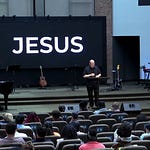Click here to view or download class notes for this session (PDF).
Few things give the enemy a greater open door than unforgiveness. I know this is near to the Lord’s heart. And taking heed to these issues will help you to grow faster than almost anything. You can go to the greatest conference, hear from the most anointed speakers, but if you don't have a heart that can incorporate what you're hearing into your life, you're actually doing yourself damage. Because all you're doing is adding more knowledge without increasing in love. The Bible warns us that knowledge puffs us up – it inflates us, but love edifies us, or builds us up.
So, let’s look into some of these things and, as always, I hope you will continue to reflect on them and study them for yourself.
1. WALKING IN FORGIVENESS.
Let’s begin by looking at some questions that will help us explore how we can walk in forgiveness.
1.1. What is the Kingdom of God like? (Matt. 18:21-35)
Let’s review Jesus’ teaching on forgiveness, from Matthew chapter 18. I’ll go through it verse by verse.
Then Peter came to Him and said, “Lord, how often shall my brother sin against me and I forgive him? Until seven times?”
Now, seven times was a lot. Perhaps Peter thought he was being generous, because the rabbis only taught three times.
Jesus said to him, “I do not say to you, ‘Until seven times;’ but, ‘Until seventy times seven.’”
Does this mean you should actually count up to 490 times? No. Jesus uses the large number to tell Peter he needs to forgive all the time.
“Therefore the kingdom of Heaven has been compared to a certain king who desired to make an accounting with his servants.”
When Jesus uses this phrase it’s highly important. He’s telling you what life is to be like as citizens of the Kingdom. How does the Kingdom operate, and if you live in the Kingdom, how should you live?
“And when he had begun to count, one was brought to him who owed him ten thousand talents.”
Notice that an accounting would be held of all the king’s subjects. This is important because none of us should think that our dealings are secret from God, or that there will not be an accounting one day.
What does Jesus mean when He says, “10,000 talents?” A talent was a unit of weight, anywhere between let’s say 80 and 120 pounds. Ten thousand talents would be almost $50 billion at today’s gold prices. The idea is of an impossibly large sum. A single talent was 15 years’ wages for a manual laborer.
“But as he had nothing to pay, his lord commanded that he, and his wife and children, and all that he had, be sold, and payment be made. Then the servant fell down and worshiped him, saying, ‘Lord, have patience with me and I will pay you all.’ Then the lord of that servant was moved with compassion and released him and forgave him the debt.”
Notice the compassion of the king – he did more than just delay the debt; he forgave it! God’s grace is so much greater than we ask!
“But the same servant went out and found one of his fellow servants who owed him a hundred denarii. And he laid hands on him and took him by the throat, saying, ‘Pay me what you owe.’ And his fellow servant fell down at his feet and begged him, saying, ‘Have patience with me and I will pay you all.’ And he would not, but went and cast him into prison until he should pay the debt. So when his fellow servants saw what was done, they were very sorry. And they came and told their lord all that was done. Then his lord, after he had called him, said to him, ‘O wicked servant, I forgave you all that debt because you begged me. Should you not also have pitied your fellow servant, even as I had pity on you?’”
Notice that the same request was made: be patient and I will pay you all. Now, this is not an insignificant amount of money. A denarius was a day’s wage, so 100 denarii is about four months’ wages.
What’s my point? God does not minimize wrongs done to us; He does not say that they are trivial or that you do not have real wounds. What he does say is that to hold it against the person is wrong.
Notice that the unmerciful servant could make no reply. What could he say? And what can we say, in the light of the mercy we have received from the Lord?
“And his lord was angry, and delivered him to the tormentors until he should pay all that was due to him.”
What are the tormentors? They are the consequences to us, in our hearts, our minds, and our bodies, of unforgiveness. When we fail to forgive, we reap a harvest of destroyed relationships, of bitterness, of resentment, and even physical illness. Many people have made the connection between unforgiveness and various physical ailments.
And in a very real way you are chained to the events. You keep reliving them and rehearsing your angry feelings. Your body is a marvelous machine. When you remember that thing that bothered you 15 years ago, you will experience the same emotions you experienced then.
Jesus concludes with the most terrible consequence: that when you fail to forgive, you are in a spiritual prison: “So likewise shall My heavenly Father do also to you, unless each one of you from your hearts forgive his brother their trespasses” (Matthew 18:21-25).
1.2. Why do we forgive?
“Let all bitterness and wrath and anger and tumult and evil speaking be put away from you, with all malice. And be kind to one another, tenderhearted, forgiving one another, even as God for Christ's sake has forgiven you” (Ephesians 4:31-32).
First, we forgive because we ourselves have been forgiven of a debt of 10,000 talents. If God forgave us such a debt, how can we hold others in the prison?
The word “forgiving” there means giving grace. Grace is more than mercy. Mercy, as we know, means not giving someone what they deserve. But grace means giving someone what they don’t deserve.
Here God is answering two concerns we have about forgiving people. The first concern is this: You don’t know what a terrible thing they did to me. God says that’s irrelevant: if we’re walking in His grace you will do what He did – forgive all the terrible things we did!
The second concern is this: Who should go first? “I’ll forgive them, but I want them to come and repent first, and cry on my rug. Then I’ll cancel their debt.” Grace doesn’t do that – you know why? Grace goes first! God so loved the world that He… gave!
God went first… and if we want to imitate our Father, we’ll do the same!
1.3. Who may not be forgiven?
“And when they had come to the place which is called Calvary, there they crucified Him, and the criminals, one on the right hand, and the other on the left. Then Jesus said, ‘Father, forgive them; for they do not know what they are doing’” (Luke 23:33-34a).
This is self-explanatory, but Jesus forgave everybody! He is the model. Not your favorite author’s viewpoint. Whatever anyone has ever done to you is not as terrible as being crucified. Now, I know that some of us have suffered terrible things at the hands of other people. And we’ll talk about the possibility of forgiving those people, for our own good and theirs.
1.4. What should not be forgiven? And what if I do not forgive?
“And when you stand praying, forgive, if you have anything against any, so that your Father also who is in heaven may forgive you your trespasses. But if you do not forgive, neither will your Father who is in heaven forgive your trespasses” (Mark 11:25-26).
Jesus said, if you have anything… against anyone! And Jesus taught that our own forgiveness is conditional upon our forgiving others. See again what he says in Luke 6: “…be merciful, as your Father also is merciful. Judge not, and you shall not be judged; condemn not, and you shall not be condemned; forgive, and you shall be forgiven” (see Luke 6:31-37).
1.5. How can I forgive others?
1.5.1. By the love of God which has been poured out in our hearts.
“…the love of God has been poured out in our hearts through the Holy Spirit given to us” (Romans 5:5b).
God’s Spirit within us gives us a reservoir and a flow of His love toward others. “And they stoned Stephen, who was calling on God and saying, ‘Lord Jesus, receive my spirit.’ And kneeling down, he cried with a loud voice, ‘Lord, do not lay this sin to their charge’” (Acts 7:59-60a).
This clearly shows that it is possible to love and forgive as Christ did, even in the worst of situations!
1.5.2. By an act of our will – a choice we make to obey God in releasing them and praying for them. You have heard that it has been said, “You shall love your neighbor, and hate your enemy.” But I say to you, love your enemies, bless those who curse you, do good to those who hate you, and pray for them who despitefully use you, and persecute you; so that you may be the children of your Father who is in heaven: for he makes his sun to rise on the evil and on the good, and sends rain on the just and on the unjust. (Matthew 5:43-45)
You say… what will I feel? I say, feelings will follow. If you are truly praying for that one who harmed you, if you are asking God to bless him, God will turn your heart towards him.
The writer Corrie ten Boom said, “Forgiveness is an act of the will, and the will can function regardless of the temperature of the heart.”
Corrie ten Boom was a Dutch woman who suffered in a concentration camp during World War II because she and her family helped to hide Jewish people from the Nazis. She lost her father, her sister and her brother. She miraculously survived and spent the rest of her life traveling the world sharing Jesus with people. She told a remarkable story about going back to Germany years later and what happened when she shared the Word of God in Munich, which was the spiritual center of Nazism. These are her words:
“It was at a church service in Munich that I saw him, a former S.S. man who had stood guard at the shower room door in the processing center at Ravensbruck. He was the first of our actual jailers that I had seen since that time. And suddenly it was all there – the roomful of mocking men, the heaps of clothing, [my sister] Betsie's pain-blanched face. He came up to me as the church was emptying, beaming and bowing. “How grateful I am for your message, Fraulein.”
He said, “To think that, as you say, He has washed my sins away!” His hand was thrust out to shake mine. And I, who had preached so often to the people in Bloemendaal the need to forgive, kept my hand at my side. Even as the angry, vengeful thoughts boiled through me, I saw the sin of them. Jesus Christ had died for this man; was I going to ask for more?
“Lord Jesus, I prayed, forgive me and help me to forgive him. I tried to smile, I struggled to raise my hand. I could not. I felt nothing, not the slightest spark of warmth or charity. And so again I breathed a silent prayer. ‘Jesus,’ I prayed, ‘I cannot forgive him. Give me Your forgiveness.’ As I took his hand the most incredible thing happened. From my shoulder along my arm and through my hand a current seemed to pass from me to him, while into my heart sprang a love for this stranger that almost overwhelmed me.
And so I discovered that it is not on our forgiveness any more than on our goodness that the world's healing hinges, but on His. When He tells us to love our enemies, He gives, along with the command, the love itself.”
We serve the God who says He will wipe away all tears from our eyes. Didn’t it hurt Corrie to know how these people had brutalized her sister? Not to mention herself? Of course. But God is the God of all comfort; He knows there are some hurts that only He can heal – and He will heal them if we let Him.
1.5.3. By trusting in the justice and vindication of God.
“Beloved, do not avenge yourselves, but give place to wrath; for it is written, ‘Vengeance is Mine, I will repay,’ says the Lord. Therefore ‘If your enemy should hunger, feed him; if he should thirst, give him drink; for by doing this you will heap coals of fire upon his head.’ Do not be overcome by evil, but overcome evil with good” (Romans 12:19-21).
This is a reference to the custom in ancient villages of sharing hot coals. It may also mean shaming the person when he sees your good deeds. In either case, it’s your job to love the person and God’s job to judge. How much better when we do not take vengeance, and begin a “vicious cycle.”
1.5.4. By allowing God to heal you and by turning away from bitterness.
“Who is a God like You, who pardons iniquity and passes by the transgression of the remnant of His heritage? He does not keep His anger forever, because He delights in mercy. He will turn again; He will have pity on us. He will trample our iniquities. Yes, You will cast all their sins into the depths of the sea” (Micah 7:18-19).
This passage shows us the way God forgives, and He would have us do likewise. When you forgive someone, don’t go fishing again for those sins you buried in the sea of forgetfulness. Don’t dredge up the past or rehearse those hurts again.
Now, restoring a person to the fullness of your trust may be a separate issue. If your employee was robbing you blind, you should forgive him, but maybe he shouldn’t be working the cash register.
Jesus said, “Be as wise as serpents and as harmless as doves” (Matthew 10:16). This is a difficult balance. I think when Jesus says to be as wise as serpents, He doesn’t mean to be crafty, but to be cautious. Many Christians are innocent, as they should be, but are not prudent. The great evangelist John Wesley was said to be very gullible. His brother, the famous hymn-writer Charles Wesley, said that John was “born for the benefit of” people who wanted to take advantage of him.
Scripture says we owe to all men the duty of love. Beyond that, we need the wisdom of God to know how to deal with people.
“Pursue peace and holiness with all people, without which no one shall see the Lord: looking diligently lest anyone fall from the grace of God; lest any root of bitterness growing up cause trouble, and through this many be defiled…” (Hebrews 12:14-15).
Bitterness is like a root, and if it is not pulled up it will grow up. The root of bitterness spreads like this: “Oh, you know what they did to me?” And then you tell the person. Before you know it, there’s another person you’ve embittered, who says, “Wow, I didn’t know they were like that.” And so it spreads.
So, every one of us needs to ask whether we’ve left anyone in the prison of our unforgiveness. Is there anyone you need to let out? Because if you let them out, you will go free, too! Forgive, and you will be forgiven.

2. RESOLVING KINGDOM CONFLICTS.
Kingdom “management” is different from managing things of this world.
We approach conflicts knowing that everyone involved is someone for whom Christ died. We also remember that everyone involved is also “in process.” So, priorities, goals, and methods in resolving conflicts must be those of the Kingdom, not the world.
2.1. Priorities in Kingdom conflict resolution.
2.1.1. The truth.
“For we can do nothing against the truth, but for the truth” (2 Corinthians 13:8).
God is so concerned about truth that He calls Himself the “Spirit of Truth.” It’s rare for God to name Himself in the Scripture, so when He does, we need to pay attention. Jesus said, “I am the truth.” As Christians, we are called to be people of truth. We must have the highest concern for the promotion of the truth. Truth here has two senses:
First, it means the absence of falsity. Truth should be prized in all our dealings, and we must avoid every form of deception and exaggeration.
We must ask what really happened, not come up with “spin.”
There can only be real reconciliation between people when they acknowledge the truth. This means having God’s perspective rather than my “version” of events.
If you don’t have a love for the truth, you will become unteachable. If you don’t embrace truth, you will fall away from it. At the end of the age, God will send delusion on people as a judgment because they did not receive a love for the truth so as to be saved (see: 2 Thessalonians 2:8-12).
Decide to be a person of Truth. If you have been prone to exaggeration or so-called “white lies,” keep track of how often you misuse your tongue. Remember, if you always tell the truth, you never have to remember your story!
Second, truth doesn’t just mean truthfulness, but it also means the truth of the Gospel. As messengers of Christ, we must uphold the Word of Christ. We don’t try to “help” the Gospel along by using falsehoods, however well-meaning. Christ would never be false in His own cause, and neither can we. Jesus needs no lies to build His Kingdom.
2.1.2. Another priority is the unity of the Spirit.
“…With all lowliness and meekness, with longsuffering, forbearing one another in love; endeavoring to keep the unity of the Spirit in the bond of peace” (Ephesians 4:2-3).
The Spirit creates the unity of the Church by taking human beings and making them members of Christ’s body. By one Spirit we were all baptized into the Body of Christ.
Paul says we must “endeavor” to keep the unity. The Greek word there means to speed, be diligent. This means that when there are breaches in the walls of love which protect the Body, we must make haste to repair them.
Unity is guarded in the bond of peace. This means that Christians and particularly leaders must strive to follow the things that make for peace (Romans 14:19). Christians in conflict must do everything that is biblically commanded in order to preserve peace—and make peace where it is broken—for the sake of safeguarding the unity of Christ’s Body.
2.1.3. The testimony of the Church.
“Dare any of you, having a matter against another, go to law before the unjust, and not before the saints?” (1 Corinthians 6:1).
Conflicts may also involve the outward testimony of the Church, in other words, our ability to represent Jesus to the world without scandal. If we love Jesus, we need to think seriously about the Church’s reputation before our own sense of injury.
The matter of lawsuits is just one example where Christians can show themselves to be no different from people of this world. Such things give opportunity to people’s flesh to dismiss the message of Christ and despise His servants.
Remember that the flesh is already looking for excuses not to believe!
Believers need to avoid creating offenses and scandals that reach outside the walls of the Church. Sadly, many are more concerned with self-vindication.
2.2. Goals in Kingdom conflict resolution.
2.2.1. Reconciliation to God
“Against thee, thee only, have I sinned, and done this evil in thy sight…” (Psalms 51:4a).
This verse doesn’t mean that David had committed no sin against Uriah or Bathsheba. But David knew that “vertical” reconciliation must come first, otherwise “horizontal” reconciliation is hypocritical.
Paul says that Christians have been given the ministry of reconciling people to God (2 Corinthians 5:18). This requires sensitivity to the Holy Spirit, as God deals with us in a personal and individually crafted way. God will know how to work on us; He deals with us all differently, seemingly working on different things at different times.
2.2.2. Reconciliation to each other.
The second goal is of course reconciling brothers to each other. It is easier to keep some commands than others, especially when we feel wronged, but this is indeed a command from our Lord and not merely helpful advice from a friend.
2.2.3. Reconciliation to leadership and vision.
“Finally, be ye all of one mind…” (1 Peter 3:8a).
The third goal is restoring people to the common purpose and vision in the assembly or the mission, wherever possible. If people are willing to be adjusted in their spirits to the “vision of the house,” this is a good thing. As Americans who are given to individualism, we need to remember that there is a corporate thing God is doing - not just an individual work in our lives. We’re not just people of God, we’re a people of God!
However, people cannot always agree to walk together on the same path. This does not mean they are less worthy believers than us.
The New Testament doesn’t cover up the bumps in Kingdom relationships. Some disputes may be resolved over time (for example, Paul and John Mark). In other cases (such as Paul and Barnabas) we are not sure if resolution was ever achieved. In any case, the parties must forgive one another and commit to walk in love together despite their differing approaches or visions. This can be a challenge for us, because a person who leaves is not necessarily a “bad person.”
2.3 Methods in resolving conflicts among Christians.
These are not methods per se, so much as they are commitments of the heart.
2.3.1. Handle with prayer.
You will need the help of the Spirit in conflict situations. Remember our discussion of the Spirit of counsel and might.
We need to remember not to function out of our charism, or gift, but minister out of the anointing, getting fresh wisdom and oil for each situation.
Don’t “phone it in,” but prepare for every ministry event and encounter as best you can by seeking God. The busyness of ministry life in America is destructive and unwholesome. I think I read somewhere that the average Protestant minister in America prays 39 minutes a day; Pentecostals for 47 minutes. However, the average Korean pastor prays two hours a day.
2.3.2. Commit to follow Jesus’ commands.
We need to follow all Jesus’ teaching concerning forgiveness and how we treat people. If you’re in leadership, you’re setting the tone by whether you’re imitating and obeying Christ in these things. His instructions are not optional.
The “way” is the issue for many: there are many who believe in the truth, and will fight for it, but truth is only part of discipleship. Being willing to not only follow a certain doctrine but also to follow the way of Christ is the main issue in being a disciple of Christ.
Jesus said, “I am the way.” The first name for Christianity was actually, “The Way.” Are we in “the way of the Lord” or are we just in the Lord’s way?
2.4. In practice.
Seek to defuse aggression, cruelty, and revenge. Appeal to people to “dial it down” and help them see when emotion is driving them. Don’t misunderstand me. Emotion isn’t necessarily wrong, but not all emotion is productive.
Gentle instruction will help people see the big picture. Remind people of the goals of forgiveness, Christlikeness, and the fear of the Lord.
Christians should seek arbitration through the Body, not the courts of Man.
What about pointing out doctrinal errors? Remember that the Bible says we are to instruct those who oppose us in meekness. A contentious spirit wins applause on the Internet, but not in church.
Remember that not everyone is teachable. You will need God’s help to know when you’ve reached the point of casting pearls before swine. Let God tell you when the argument is done. You don’t have to “swing at every pitch.”
What about shunning people and/or excommunication? The Word makes provision for that in case of flagrant sin. Paul talks about the evil of some which is like a cancer. The only way to deal with that is to cut it out. Even in the case of excommunication, the goal is redemptive – so that a person’s spirit may be saved in the Day of Jesus. Second Corinthians is a sequel with a happy ending! Such things often begin with not having a love for the truth – “I know the Bible says this, but…”
The wisdom of saying, in essentials, unity; in doubtful matters, liberty; in all things, charity:
Unity is required in certain matters or else a person isn’t even a Christian to begin with.
In our day we have supposed Christians who don’t believe in the Virgin Birth, or that Jesus is God. These things are a sign of the apostasy of the last days: “…there shall be false teachers among you, who privily [secretly] shall bring in damnable heresies, even denying the Lord that bought them, and bring upon themselves swift destruction” (2 Peter 2:1).
In doubtful matters, it’s not my job to judge where Christ has not spoken.
In all things charity, for we must live before others and treat others as Christ would in any case. Remember that love never fails (what does that mean by the way?), and that God is love!

3. SOME THOUGHTS ON DEALING WITH CRITICISM AND OPPOSITION.
“And the servant of the Lord must not strive, but be gentle to all men, able to teach, patient, in meekness instructing those who oppose; if God perhaps will give them repentance to the acknowledging of the truth, and that they may recover themselves out of the snare of the devil, who are taken captive by him to do his will” (2 Timothy 2:24-26).
1. We will inevitably encounter criticism in the ministry. How we respond to it will be a key factor in how quickly and how well we grow.
2. It is also inevitable that we’ll encounter false brethren and false teachings.
3. The ability to respond well to criticism and opposition is a grace from God, not a matter of personality. To the degree that our responses are driven by our human temperament, we cut ourselves off from the Spirit’s leading.
Outward manifestations of the problem: Strong-souled, forceful people may lack the sensitivity to respond to people well; weak-souled, sensitive people may lack the strength required to confront others appropriately.
Inward effects of the problem: strong-souled leaders may become angry, controlling, and quick to give up on others; weak-souled leaders may become indecisive and passive-aggressive, nurturing bitterness against those with whom they find themselves in conflict. In either case, failure to follow the Lord’s prescriptions for dealing with people can lead to cynicism and burnout.
4. It is a Kingdom essential that we walk in God’s way with these matters, so that His life and grace can be released into them.
The leader’s public response to criticism and opposition:
The word "strive" in 2 Timothy 2 literally means to make war; metaphorically speaking it means to quarrel. The leader must avoid arguments and quarrels against those who oppose Christ and who oppose him. Paul contrasts striving, contentious behavior with four positive skills and attitudes every shepherd and aspiring shepherd needs:
1. Gentleness;
2. Ability to teach;
3. Patience;
4. A meek approach to instructing those in opposition.
The leader’s private response to criticism and opposition:
In the conclusion of the Beatitudes, Jesus warns us to expect some rough treatment: “Blessed are you, when men shall revile you, and persecute you, and shall say all manner of evil against you falsely, for my sake” (Matthew 5:11). But a few verses later, He tells us how to keep our hearts unspoiled: “Love your enemies, bless those who curse you, do good to those who hate you, and pray for those who despitefully use you, and persecute you” (5:44).
The leader must love his enemies, bless them, and pray for them.
Keys for surviving the storms of criticism, rejection, and opposition:
1. Pray and call upon the Holy Spirit of counsel and might. (Oh, what peace we often forfeit…)
2. If you haven’t already done so, hurry up and die already. Paul had become dead to either criticism or to praise. (See: 1 Cor. 4:3-5) Are you immune to both criticism and flattery?
3. Profit from criticisms. In many criticisms there are grains of truth.
4. Know that it is God who has placed you where you are.
5. Therefore also know that God will vindicate you, in order to vindicate His own authority.
6. Know who you are in Him and know why you are there. Paul knew that God had given him a task, supernatural power for miraculous ministry, and supernatural energy to push on through every challenge of that ministry.
7. Have faith that Jesus is building His Church. The Church of Christ will not only survive the opposition and divisions of men, but also our mistakes. He is growing you – not just as a believer but as a leader!
MINISTRY TIME / PRAYER:
Father, right now, in the Name of Jesus, I forgive ________________. I forgive them as an act of my will for what they did to me. I bless them in the Name of Jesus, and I pray for them that they will experience the love and grace of God in full measure. Forgive me for harboring unforgiveness and bitterness in my heart. Purify my heart!
I refuse to keep this person in the prison of my unforgiveness, and I refuse to make him pay for what he has done to me.
I ask you to let me walk in your love and grace towards everyone, just as Jesus taught us. In His Name I pray. Amen.










